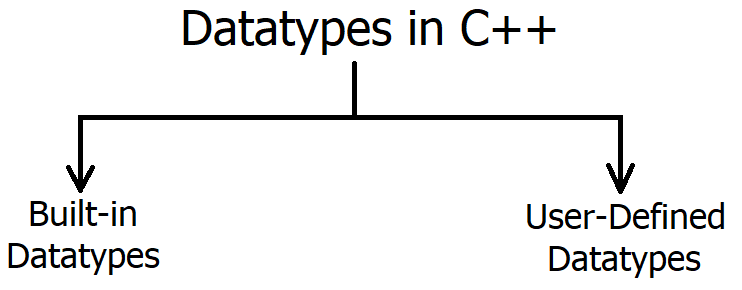Hello Readers,
In the previous tutorial, we discussed the variables in C++. Today, we’ll discuss the datatypes and modifiers in C++. Datatypes are used to define the type of variables and contents used. Data types are of two types:
- Built-in datatypes
- User-defined or abstract datatypes
Here is the official documentation if you wanna look at it. But, the problem with this is, it is a little bit confusing. Here, we have presented a complete, accurate & concise knowledge of the modifiers and datatypes in C++.
Built-in datatype
These are the datatypes that are predefined and are used directly in the program. For eg: int, char, etc.
Basic built-in datatypes in C++
These are the types, that user creates as a class or a structure. In C++ there are classes, whereas in C language user-defined datatypes are implemented as structures.
char | for char storage (1 byte) |
int | for integral numbers (2 bytes) |
float | for single-precision floating-point (4 bytes) |
double | double-precision floating-point numbers (8 bytes) |
Example:
char a = 'A'; // character type
int a = 1; // integer type
float a = 3.14234; // floating point type
double b = 6e-4; // double type (e is for exponential)
Related:
User defined or Abstract data types
These are the types, that user creates as a class or a structure. In C++ there are classes, whereas in C language user-defined datatypes are implemented as structures.
Modifiers in C++
In C++, special keywords (called modifiers) can be used to modify/change the meaning of the predefined built-in data types and expand them to a much larger set. There are four datatype modifiers in C++ :
- long
- short
- signed
- unsigned
The above-mentioned modifiers can be used along with built-in datatypes to make them more precise and even expand or decrease their range.
Below mentioned are some important points about the modifiers:
- long and short increase or decrease the maximum and minimum values that a data type will hold.
- A plain ‘int’ must have a minimum size of that of short.
- Size hierarchy of int : short int < int < long int
- Size hierarchy for floating numbers is : float < double < long double
- long float is not a legal type and there are no short floating point numbers in C++ language nor in C language.
- Signed types is the default type which includes both positive and negative numbers.
- Unsigned numbers are the numbers those are without any sign, that is always positive.
So, this is all about the datatypes in C++. If you have any doubts you can post in the comment section, or you can always mail at cpptopics@techoutflow.com. In the next tutorial, we’ll see the operators in C++. The next tutorial will be published soon.
Till then, stay tuned.

